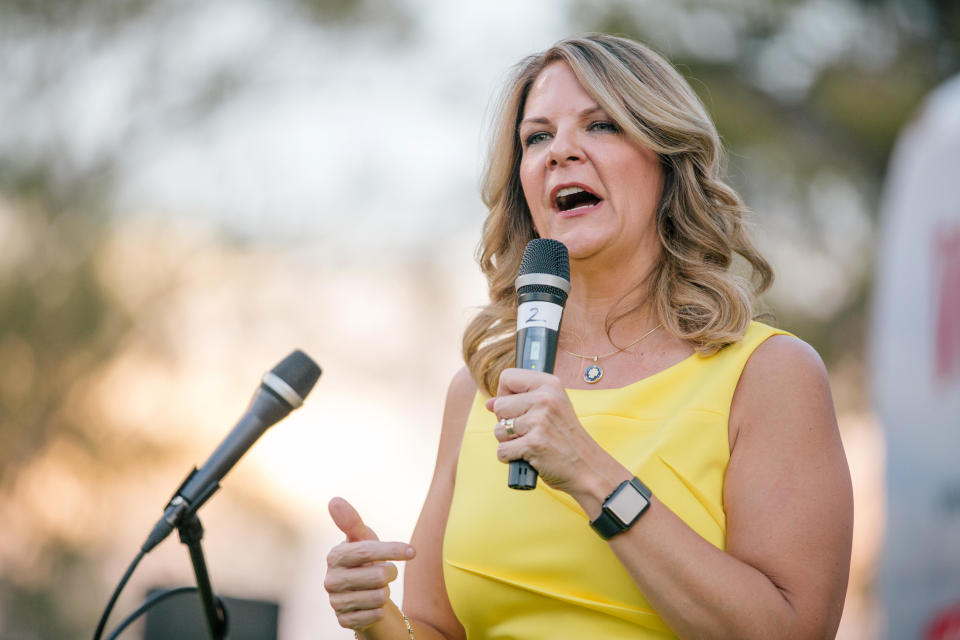Kagan temporarily pauses subpoena for Arizona GOP chair's phone records
- Oops!Something went wrong.Please try again later.
Washington — Supreme Court Justice Elena Kagan on Wednesday night ordered a temporary pause on a subpoena — issued by the House select committee investigating the Jan. 6, 2021, assault on the U.S. Capitol — for the phone records of Arizona Republican Party chairwoman Kelli Ward.
In her order, Kagan stayed an Oct. 22 ruling from the U.S. Court of Appeals for the 9th Circuit, which allowed the Jan. 6 House committee to obtain the records, "pending further order of the undersigned or of the court."
Attorneys for Ward and the Jan. 6 committee have a deadline of 5 p.m. ET Friday to file responses to Kagan's order.
In an emergency request to Kagan, who oversees applications from the U.S. Court of Appeals for the 9th Circuit, Ward argued the subpoena from the House panel is a "first-of-its-kind situation" involving a request for phone records from a state party chair, sought by a congressional committee largely composed of members from the rival party.
"If Dr. Ward's telephone and text message records are disclosed, congressional investigators are going to contact every person who communicated with her during and immediately after the tumult of the 2020 election. That is not speculation, it is a certainty. There is no other reason for the committee to seek this information," Ward's lawyers wrote. "There can be no greater chill on public participation in partisan politics than a call, visit, or subpoena, from federal investigators."

The committee issued a subpoena to T-Mobile, Ward's phone provider, in January, seeking call records, phone numbers, text messages and IP addresses that communicated with Ward's number after the 2020 election. The Arizona GOP chair was among a group of people tied to an unsuccessful scheme to have a slate of so-called alternate electors cast electoral votes for Trump, who lost the state to President Biden.
But Ward filed a request in federal court to quash the subpoena, and the committee in turn called on the court to dismiss the case several months later. After the district court granted the request from House investigators, Ward turned to the U.S. Court of Appeals for the 9th Circuit. The California-based appeals court, however, upheld the lower court's ruling that allowed the House committee to obtain the records.
In her filing with the Supreme Court, Ward said her case has "profound precedential implications for future congressional investigations and political associational rights under the First Amendment," particularly given the events it involves: the 2020 presidential election and Jan. 6 attack on the Capitol.
While the select committee does not "mete out punishment," Ward argued, turning over phone records to the panel risks exposing the people she was in contact with to congressional or federal investigations, as well as public criticism.
"In a case like this the punishment is the process; the harm comes from the fear that your views will be exposed, that you can be the next person to expect a knock on your door from government investigators, and that you may be required to face the disastrous personal and financial consequences of having to retain counsel and appear before the committee to answer for your political affiliations and opinions," Ward told the Supreme court. "This sets a terrible precedent for the future of public participation in American politics."
Ward is the latest Republican to ask the Supreme Court to intervene in cases stemming from investigations into the events surrounding the Jan. 6 assault on the U.S. Capitol.
Trump last year asked the high court to block the National Archives and Records Administration from turning over his White House records to the House panel, which the justices declined to do, and GOP Sen. Lindsey Graham of South Carolina asked the court to temporarily keep him from having to testify before a Georgia grand jury.
Justice Clarence Thomas on Monday temporarily paused the lower court order that required him to answer questions before the grand jury, which is investigating efforts in Georgia to reverse the outcome of the 2020 election.
Legal status of hundreds of thousands of immigrants at risk after talks collapse
Examining how crime data is used by election campaigns
Pennsylvania Senate candidates John Fetterman, Dr. Mehmet Oz face off in debate

